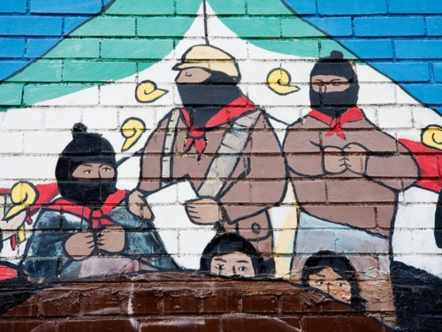North America’s Restless Natives
24 Apr 2012
While those like Andres Rozental highlight the benefits of further economic and even political integration, mainstream opinion still largely opposes this project. More often than not, the fear of integration is fueled by concerns that it will encourage 1) bureaucratic elitism and the creation of an inevitably self-interested bureaucratic overclass; 2) locked-in, institutionalized insensitivity to local conditions and needs; 3) an inexorable tendency towards social engineering at the macroscopic level, particularly in the case of material redistribution; and 4) a tendency toward socio-cultural homogenization that would cast a smothering “The Great Same” over the ways human beings organize their socio-economic and political lives. It is this latter fear, among others, that has rekindled the identity politics we see today – an anti-integration politics that exists within the political mainstream and without. In the last case, integration threatens the interests of movements as serious as the Zapatistas in southern Mexico to those as inconsequential as the Nevis Independence Movement. Such outliers argue that, in the case of North America, the current extent of economic and political integration is already too much. With all these thoughts in mind, today’s map highlights the rebuttals to regional integration in North America, which do vary in terms credibility and notoriety.
Please click on the embedded links to find out more about the agendas of different indigenous and separatist movements in this part of a semi-integrated world.
[Resource Embedded:141387]
external pageLarge Mapcall_made
Partner Content

Minorities and Green Political Thought: Normative Challenges to an Ideal Ethics. To the Zapatistas in Mexico, the destruction of the jungle for oil extraction and large-scale logging were some of the core issues that motivated their freedom movement. Native Americans in other parts of the Western hemisphere are known for a moral concern for the Earth that provides for more natural management of the environment than any environmental agency could muster. In other words, in action and perhaps ontologically, minorities are being redefined along the lines of Green ideas and ecological characteristics.

The Awakening: The Zapatista Revolt and its Implications for Civil-Military Relations and the Future of Mexico. This study examines the origins and nature of the Zapatista rebellion in Chiapas, the response of the Mexican government and military, and the implications for civil-military relations and the future of Mexico. It places the armed forces' reaction within the context of the institution's resonse to the country's accelerated transition to democracy and analyzes the implications of that democratization for the army.

A "Mere Rustle of Leaves": Canadian Strategy and the 1970 FLQ Crisis. The literature dealing with the Canadian government's response to political violence in Quebec has focused on the political aspects of separatism and the legal ramifications of the War Measures Act. There is little examination of the larger aspects of Canadian strategy or the activities of the Canadian Forces within the context of this strategy during the period leading up to the climax of Front de la Liberation du Quebec (FLQ) activities in 1970.

The Domestic Cost of NATO Membership: Canada's Commitment to NATO Unity and the Growth of Separatism in Quebec, 1956 - 1967. This chapter investigates the link between the Canadian government's NATO policies and the rise of the separatist movement in Quebec in the first half of the 1960s. The author describes that given its interests in a smooth relationship with France and in the preservation of NATO unity, Ottawa submitted independent Canadian interests to the interests of Paris in French-speaking Africa up to French President de Gaulle's 1966 withdrawal from NATO's integrated command. For Quebec nationalists, this asymmetry was evidence that only an autonomous or independent Quebec could be a true promoter of French Canadian interests.
Further Reading
Cleaver, Harry. The Zapatista Effect: The Internet and the Rise of an Alternative Political Fabric. Universidade Federal Fluminense, 2011
Dinerstein, Ana. external pageSocial Movements, Autonomy and Hope: Notes on the Zapatista Revolutioncall_made. Routledge, 2012
Featherstone, Dave. external pageWithout History: Subaltern Studies, the Zapatista Insurgency and the Specter of Historycall_made. Bulletin of Latin American Research, 2012
Erk, Jan. external pageIs Nationalism Left or Right? Critical Juncture in Quebecois Nationalismcall_made. Nations and Nationalism, 2010

